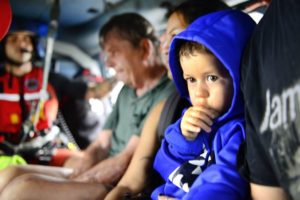
Sources: American Red Cross, FEMA, Texas AgriLife Extension Service, University of Missouri Extension
Children can feel very frightened both during and after a disaster. Crisis-related stress can take its toll on children especially when parents are preoccupied with day-to-day survival.
Any change can be stressful for children, but prolonged changes will be especially so. Some children will show temporary changes of behavior. For most children these changes will be mild, not last long, and diminish with time. Reminders of what happened, however, could cause upsetting feelings to return and behavior changes to emerge again. Watching scenes of the disaster on television can be distressing for children, especially for younger children. Younger children may return to bed-wetting, have difficulty sleeping, and not want to be separated from their caregivers. Older children may show more anger than usual, find concentrating at school harder, and want to spend more time alone than usual.
Common reactions kids may exhibit after a disaster may include irritability, stomach ache, sleeplessness, loss of appetite, fidgeting, poor eye contact, trouble concentrating, and nightmares. Keep in mind that while these are “common,” some children may exhibit none of these behaviors and others may behave in ways not mentioned.
Age specific reactions may include:
Birth – Age 6
- Irritability
- Crying more than usual
- Wanting to be held/cuddled more than usual
- Frightened about being separated from their caregivers
- Regressive behavior, such as bedwetting
Age 7-10
- Preoccupation with details of the traumatic event, wanting to talk about it continually
- Difficulty concentrating at school
- Fear that the disaster will happen again
- Sad and/or angry feelings
Age 11-18
Following a disaster, the world can seem dangerous and unsafe. Reactions may vary…
- Some may react by becoming involved in risk-taking behaviors, such as reckless driving, and alcohol or drug use.
- Others may become fearful of leaving home and avoid social activity.
- This age group may feel overwhelmed by their intense emotions, yet unable to talk about them.
How parents and caregivers react to and cope with a disaster or emergency situation can affect the way their children react. When parents and caregivers or other family members are able to deal with the situation calmly and confidently, they are often the best source of support for their children.
Parents can take steps to reduce stress and help their children cope by talking about the family’s situation.
- Try to remain positive. Although we cannot control the weather, we can control our reaction to it.
- Calmly provide factual information about the disaster and plans for insuring their ongoing safety. Determining how much information to share is up to individual families. A good rule of thumb is to not overwhelm children with too much information at once. Allow children to handle the loss in small doses, but be honest about what is happening.
- Monitor children’s exposure to news media reports about the disaster.
- Reassure children and give them physical comfort.
- Encourage your children to talk and listen to their concerns. Allow them to talk about their losses, such as death of a pet or loss of toys and other material items of importance to them. Acknowledge their feelings.
- Help them to get back to their normal routine as soon as possible. Reestablish daily routines for work, school, play, meals, and rest. Keeping a routine helps kids feel supported and safe.
- Spend time with your kids. Make room for one-on-one time with them. This lets them know you are still there for them, despite the stress and chaos.
- Remember that play is a child’s work. It might not seem appropriate in the middle of a disaster to organize games or other activities, but play is an important outlet for kids to relieve their stress.
Especially For older children…
- Give them extra attention and consideration. Temporarily relax your expectations of their performance at home and at school.
- Set gentle but firm rules for acting-out behavior.
- Give them structured but undemanding home chores and other activities.
- Encourage them to express their thoughts and feelings and be willing to listen.
Some children suffer from long-term problems such as depression, prolonged grief, and post-traumatic stress disorder (PTSD). Symptoms include persistent sadness, irritability, loss of interest in activities they once enjoyed, loss of energy, sleeping problems, and even physical problems. If a child is having difficulty recovering from the trauma of a disaster, seek the help of a qualified mental health professional.
Sources:
American Red cross and Federal Emergency Management Agency (2004). Helping children cope with disaster, http://www.redcross.org/images/MEDIA_CustomProductCatalog/m14740413_Helping_children_cope_with_disaster_-_English.pdf. Retrieved September 22, 2017.
Texas AgriLife Extension Service (20011) After a disaster: How to recover, https://texashelp.tamu.edu/wp-content/uploads/2016/02/B6203-after-a-disaster.pdf. Retrieved August 31, 2017.
University of Missouri Extension (2008). Disaster recovery: Resources for your flooded home, http://extension.missouri.edu/crawford/documents/mp0904. Retrieved September 21, 2017.
